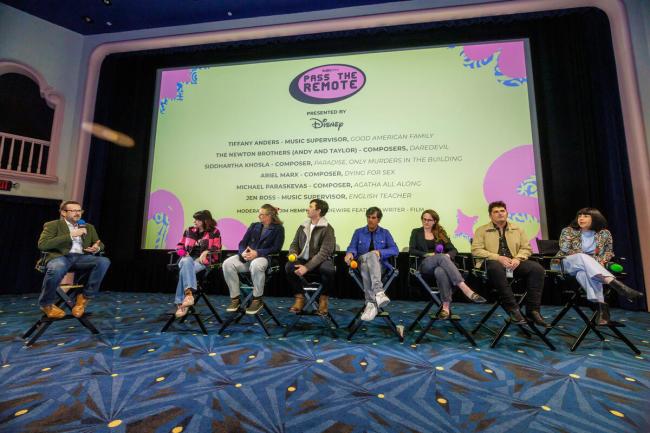Exploring the Role of Music in Television: Insights from the IndieWire and Disney Panel
On April 15, the vibrant intersection of television and music was showcased during the “Pass the Remote” panel, hosted by IndieWire and Disney at the Vidiots Foundation in Los Angeles. Esteemed composers and music supervisors gathered to share their experiences and insights into the art of crafting soundtracks that enhance storytelling.
Panelists and Their Contributions
The panel featured an impressive lineup, including:
- Tiffany Anders – Music Supervisor, “Good American Family”
- Jen Ross – Music Supervisor, “English Teacher”
- The Newton Brothers – Composers of “Daredevil: Born Again”
- Siddhartha Khosla – Composer for “Only Murders in the Building” and “Paradise”
- Ariel Marx – Composer, “Dying for Sex”
- Michael Paraskevas – Composer, “Agatha All Along”
The Art of Music Supervision
A central theme among panelists was the use of music as a narrative tool that reflects character and emotion. Tiffany Anders highlighted her approach to selecting tracks for “Good American Family,” where she strategically incorporated hits from the ’70s and 2000s to resonate with the show’s central family’s experiences.
“The parameters were, what did these people from the late ’90s and 2000s grow up listening to?” Tiffany Anders
Anders emphasized the connection of music to character development, illustrating how the track choices articulate the protagonist’s emotional landscape, such as using Green Day to convey a moment of crisis for Mark Duplass’s character.
Character Themes in Scoring
The Newton Brothers shared their perspective on composing for “Daredevil: Born Again,” where they aimed to personify the city itself through their score, tying it harmoniously to the characters it hosts.
“The city was an omniscient presence that is always calling out to its people, whether they’re the vigilantes or just everyday people,” Andy Grush
With an emphasis on themes resonant with both the character and location, their approach required balancing existing melodies from prior series with new compositions that enhance the narrative.
Innovation in Television Scoring
Siddhartha Khosla discussed the creative freedom he experiences in scoring “Only Murders in the Building,” noting that each season allows for new thematic explorations.
“[Showrunner John Hoffman] wants to reinvent stuff every season, which is exciting,” Siddhartha Khosla
Conversely, his work on “Paradise” called for a more atmospheric and experimental sound that continuously immerses the audience into the show’s thematic undertones.
Coping with Tonal Shifts
Ariel Marx encountered distinct challenges while composing for “Dying for Sex,” needing to balance tonal shifts between humor and tragedy. She emphasized her early involvement in pre-production, which allowed for ample experimentation with her scoring approach.
Unique Approaches in Music Selection
Michael Paraskevas discussed the tonal complexities in scoring “Agatha All Along,” where moving away from conventional superhero sounds was essential in establishing a new narrative for the character. His innovative use of a diverse ensemble contributed to defining the show’s unique emotional breadth.
“We tried to sympathize with her, but you don’t really understand her trauma and motivations until the very end of the show,” Michael Paraskevas
The Role of Music in World-Building
Jen Ross provided insights into crafting a nostalgic atmosphere for “English Teacher” through carefully selected 1980s pop songs. This approach aimed to evoke familiarity while framing the narrative context in a timeless way, aligning with classic coming-of-age themes.
The Business of Music Supervision
Both Anders and Ross acknowledged the often administrative nature of their roles, particularly in navigating music licensing, which can complicate the selection process. Their experiences underscore the balance of artistry and business acumen required in the industry.
The Importance of Communication
The panelists collectively noted that successful collaboration hinges on understanding the unique communication styles of directors and showrunners. Each project requires a different interpretative approach to effectively represent their visions through music.
“It’s a lot like a relationship,” Andy Grush stated, emphasizing the necessity of mutual understanding in the creative process.
Conclusion
For anyone interested in the intersection of music and storytelling in television, this panel offered invaluable insights into the creative and logistical challenges faced by music supervisors and composers alike. To explore more about the discussions that unfolded at the event, view the complete video of the panel.

